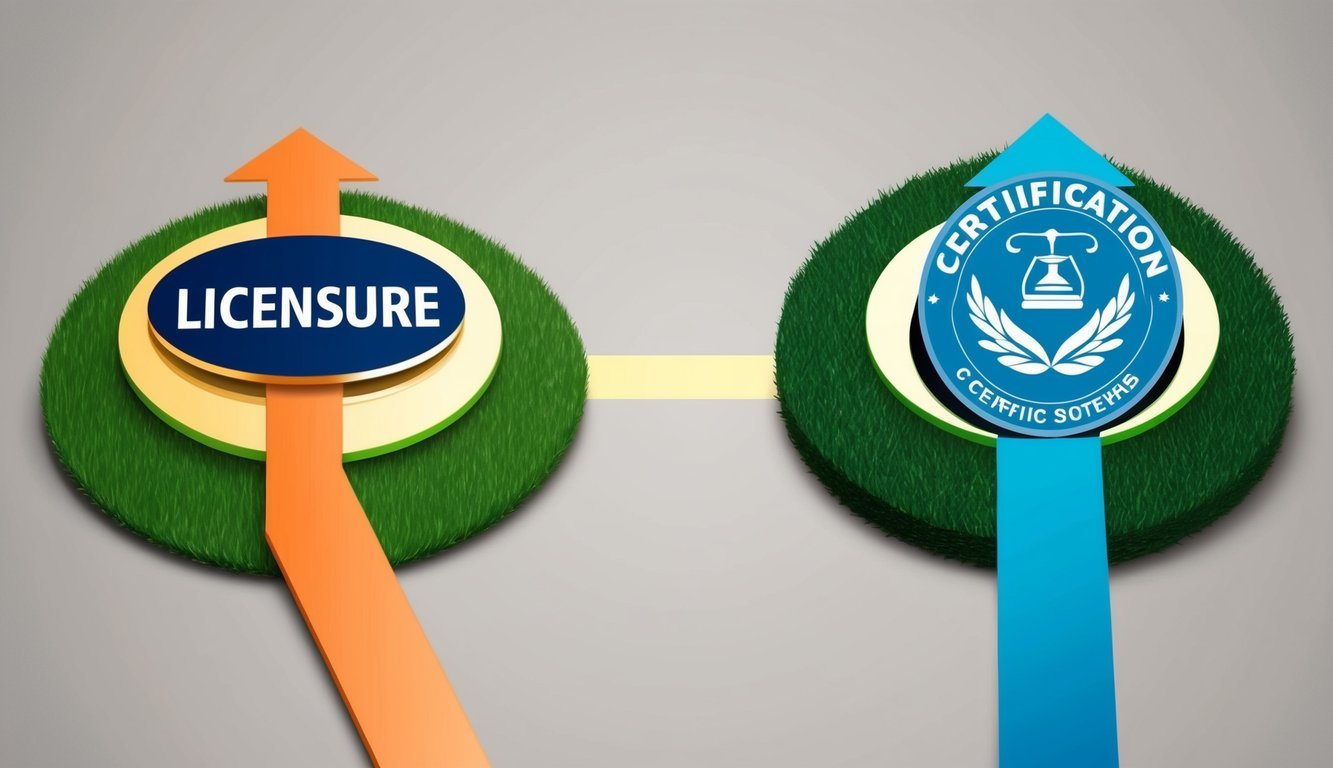If you hold a non-nursing bachelor’s degree and aspire to become a registered nurse, a Direct Entry MSN program could be your ideal path. These programs allow you to earn your Master of Science in Nursing without first obtaining a Bachelor of Science in Nursing, streamlining your journey into the nursing profession.
With a growing demand for nurses and a variety of program options available, you can find a course that fits your lifestyle and career goals.
Many Direct Entry MSN programs also offer flexible scheduling and online learning opportunities, making it easier for you to balance studies with existing commitments.
For instance, programs can often be completed in two to three years, opening doors to various nursing specialties and leadership roles.
You can explore different schools and compare tuition, accreditation, and admission requirements through resources like Nurse.org or Nursing Process.
Choosing a Direct Entry MSN program not only accelerates your education but also equips you with the necessary skills to succeed in a rewarding career.
As you consider this pathway, reviewing information about specific programs and understanding the admission process will help you make an informed decision.
Understanding Direct-Entry MSN Programs
Direct-entry MSN programs provide a pathway for individuals with non-nursing bachelor’s degrees to enter the nursing profession.
These programs are designed to streamline the transition from a different field of study to an advanced nursing role, such as becoming a nurse practitioner.
Definition and Overview of Direct Entry MSN
A direct-entry MSN program allows individuals with a non-nursing bachelor’s degree to earn a Master of Science in Nursing (MSN) while obtaining their nursing credentials.
This program typically takes 2 to 3 years to complete, combining both classroom instruction and clinical experience.
Students can expect about 30-40 hours of clinical practice and coursework each week.
The curriculum provides the knowledge and skills necessary for advanced nursing practice, preparing graduates for roles such as nurse practitioners or clinical nurse specialists.
Variety of Direct Entry MSN Programs
There are several types of direct-entry MSN programs available, catering to diverse student needs.
Many hospitals and educational institutions offer unique tracks.
Here are a few notable examples:
| University | Program Length | Characteristics |
|---|---|---|
| University of Cincinnati | 5 semesters | Full-time study, intensive clinical training |
| University of California-Davis | 18 months | Full-time format, fast-paced curriculum |
| University of Maryland | As little as 2 years | Flexible options for working students |
| Herzing University | 20-24 months online | 100% online coursework with hands-on labs and clinicals |
These programs focus on delivering comprehensive nursing education in a condensed timeframe, making them attractive to those looking to pivot careers quickly.
Entry Requirements for Non-Nursing Graduates
To enroll in a direct-entry MSN program, you must meet specific qualifications.
Typically, you need a non-nursing bachelor’s degree and a minimum GPA set by the respective institution.
Other common requirements include:
- Prerequisite Courses: Completion of foundational courses like biology, chemistry, and psychology.
- Letters of Recommendation: Supportive references from academic or professional sources.
- Personal Statement: An essay outlining your motivations and goals in nursing.
- Interview: Some programs may require an interview to assess your fit for the program.
Make sure to check the specific entry requirements for the programs you are considering, as they can vary significantly among institutions.
Admission Criteria and Prerequisites

Understanding the admission criteria and prerequisites for a Direct Entry MSN program is essential for prospective students.
This information provides clarity on the academic requirements, necessary coursework, and application logistics that you need to navigate the entry process successfully.
Minimum Educational and GPA Requirements
Most Direct Entry MSN programs require you to hold a bachelor’s degree from an accredited college or university.
In addition, a competitive cumulative GPA is vital, typically ranging from 3.0 to 3.5 on a 4.0 scale.
Some programs may consider applicants with lower GPAs but expect a strong performance in the relevant coursework.
You should verify if your degree is in a field related to healthcare or sciences, as this can enhance your application.
Institutions like the University of California-Davis specify such academic expectations, emphasizing a robust foundation in health-related disciplines.
Essential Prerequisite Courses
Completing essential prerequisite courses is a critical step before applying.
Common requirements include foundational classes in subjects such as:
- Biology
- Chemistry
- Anatomy and Physiology
- Nutrition
- Sociology
These courses not only prepare you for advanced nursing studies but also ensure you possess the necessary knowledge to take the NCLEX after graduation.
Institutions like Marquette outline their specific prerequisites, allowing you to tailor your previous studies effectively.
Professional and Clinical Experience
Many programs prefer candidates who have some professional or clinical experience, even if not mandatory.
This experience can come from roles such as volunteer work, nursing assistant positions, or other healthcare-related jobs.
Such experience demonstrates your commitment to the nursing field and enhances your practical understanding of patient care.
Some schools may require a certain number of hours in clinical settings.
You should check the specific requirements of your desired program to ensure you meet their expectations regarding professional experience.
Application Materials and Deadlines
Application requirements can vary, but most programs require the following materials:
- Completed application form
- Official transcripts from all post-secondary institutions
- Letters of recommendation (usually 2-3)
- Personal statement or essay
- Proof of relevant experience
It’s crucial to pay close attention to application deadlines, as they can vary significantly between institutions.
Keep track of when your application materials are due to avoid any last-minute issues.
Some programs, like those noted by Nursing Process, outline detailed timelines that you should review as part of your application strategy.
Curriculum and Skills Acquired

The curriculum of a Direct Entry MSN program is designed to equip you with essential nursing knowledge and skills, combining theoretical learning with practical application.
You will engage in core nursing courses, specialized training, and extensive clinical experiences to prepare for a range of nursing roles.
Core Nursing Courses and Specializations
Core nursing courses form the backbone of your education.
These courses typically cover foundational topics such as nursing theory, health assessment, pharmacology, and pathophysiology.
You will learn about evidence-based practice, which emphasizes using research to inform your clinical decisions.
Specializations allow you to focus on areas like clinical nursing leadership, public health nursing, or becoming an advanced practice registered nurse (APRN).
Programs also incorporate simulation center experiences, enhancing your clinical skills in a controlled environment.
Clinical Placement and Training
Clinical placement is a critical component of your training.
During these placements, you will work in various healthcare settings, applying your knowledge under the supervision of experienced professionals.
You may gain experience in hospitals, community clinics, or long-term care facilities.
These hands-on experiences not only develop your nursing skills but also enhance your competence in patient care and teamwork.
Training often includes direct patient interaction, allowing you to refine your communication and clinical decision-making skills.
This practical exposure is vital for your transition from student to practicing nurse.
Advanced Nursing Theory and Practices
Advanced nursing theory courses delve into complex concepts such as nursing leadership and advanced clinical practices.
You will explore frameworks that govern effective nursing practice and learn how to lead teams in diverse healthcare environments.
Additionally, these courses often incorporate discussions on ethical decision-making and the role of a clinical nurse leader.
Understanding these principles prepares you for the challenges of modern healthcare settings.
You will also focus on the integration of advanced practice concepts, empowering you to contribute to nursing education and improve patient outcomes.
This comprehensive approach prepares you to excel in various roles within the nursing profession.
Licensure and Certification Pathways

Navigating the licensure and certification process is crucial for your career as a Direct Entry MSN graduate.
Understanding the steps involved in accessing RN licensure and pursuing advanced practice specialties is essential for your professional development.
Exam Preparation for NCLEX-RN
To become a registered nurse, you must successfully pass the National Council Licensure Exam for Registered Nurses (NCLEX-RN).
Preparation is key.
Here are steps to help you get ready:
- Review the Exam Content: Familiarize yourself with the four major test categories: Safe and Effective Care Environment, Health Promotion and Maintenance, Psychosocial Integrity, and Physiological Integrity.
- Study Resources: Utilize NCLEX review books, online courses, and practice questions to reinforce your learning.
- Practice Exams: Take full-length practice tests to build test-taking stamina and identify weak areas.
You may also consider joining a study group or attending NCLEX review workshops offered by various nursing schools or organizations.
Obtaining RN Licensure
Once you have passed the NCLEX-RN, the next step is obtaining your registered nurse licensure.
This involves several key steps:
- Application: Submit your application to your state’s nursing board. Include proof of graduation and any required fees.
- Background Check: Most states require a criminal background check.
- Verification of Clinical Hours: Ensure that you provide documentation of your clinical hours from your MSN program.
Each state varies in its specific requirements, so be sure to check your state’s nursing board website for detailed information.
You may find guidance on the application process on sites like the National Council of State Boards of Nursing.
Advanced Practice Specialties and Certifications
Once you obtain your RN licensure, you can pursue advanced practice specialties and certifications.
Here are common pathways:
-
Nurse Practitioner (NP): To become an NP, you need to earn a Master’s degree in a specific field, such as Family or Pediatric Nursing.
-
Clinical Nurse Specialist (CNS): Focuses on a particular area of nursing practice. You will need certification related to your specialty.
-
Certification Exams: After completing your educational program, you must pass a national certification exam tailored to your chosen specialty.
These certifications enhance your skills and career prospects in the nursing profession.
For detailed certification options, visit ANCC.
Career Opportunities and Advancement

Entering a direct-entry MSN program provides you with diverse career opportunities and pathways for advancement in the nursing profession.
These roles span various settings, salary expectations are increasingly favorable, and there are multiple avenues for further education.
Roles and Settings in Nursing Careers
With a direct-entry MSN, you can pursue various roles.
These include Family Nurse Practitioner (FNP), Psychiatric Mental Health Nurse Practitioner, or Pediatric Primary Care Nurse Practitioner.
FNPs provide comprehensive care to families, while psychiatric mental health practitioners focus on mental health needs.
You will find opportunities in multiple settings, including:
- Hospitals
- Community health organizations
- Private practices
- Educational institutions
Each role emphasizes patient care and community health, allowing you to make a meaningful impact on patient lives and health systems.
Salary Expectations and Job Market Trends
The salary for nursing roles varies based on specialization and location.
A Family Nurse Practitioner can earn approximately $115,000 annually, while Psychiatric Mental Health Nurse Practitioners may earn around $110,000.
Job Market Trends:
| Nursing Role | Average Salary |
|---|---|
| Family Nurse Practitioner (FNP) | $115,000 |
| Psychiatric Mental Health NP | $110,000 |
| Pediatric Primary Care NP | $105,000 |
The demand for nurse practitioners is on the rise.
This is largely due to a growing emphasis on primary care and preventative health strategies.
This trend augurs well for job security and advancement in various healthcare sectors.
Continuing Education and Advanced Degrees
Pursuing additional certifications or a Doctor of Nursing Practice (DNP) is advisable to further enhance your career.
Specialized fields such as Public Health Nursing or advanced practice roles require advanced degrees.
Continuing education opportunities can also include workshops, online courses, or additional degree programs.
Potential Certifications:
- Certified Family Nurse Practitioner (FNP-BC)
- Psychiatric-Mental Health Nurse Practitioner (PMHNP-BC)
These credentials support your expertise and readiness for leadership roles, promoting career advancement in a competitive landscape.

